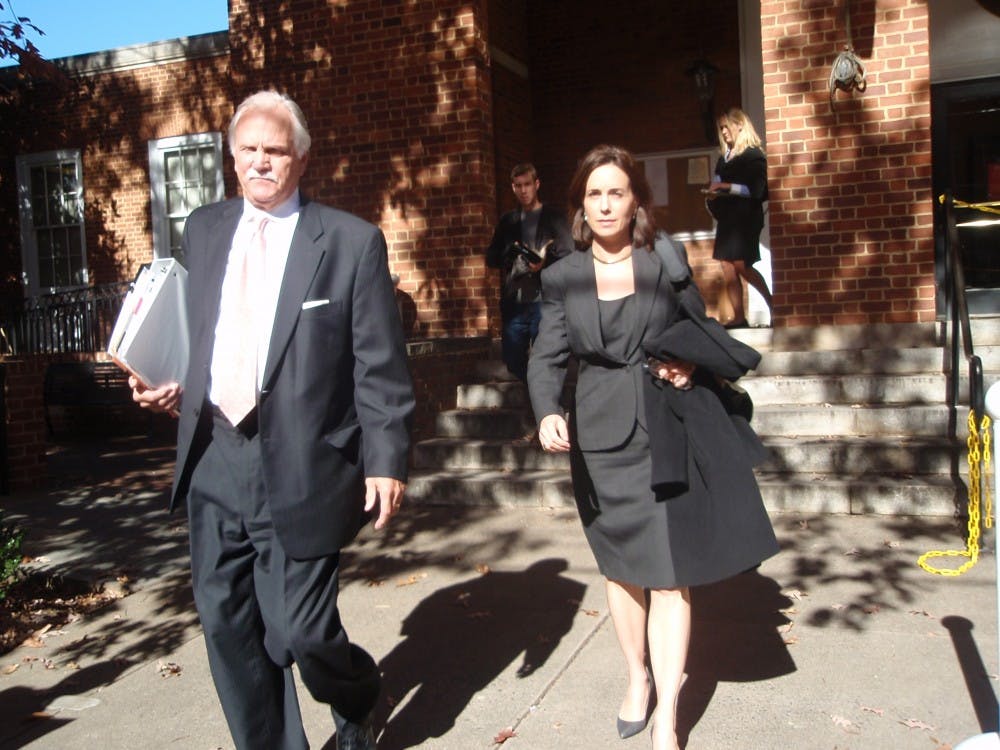Charlottesville Circuit Court Judge Edward Hogshire granted a motion yesterday to allow George Huguely's defense attorneys access to Yeardley Love's medical records. The hearing also addressed administrative issues related to jury selection and media presence, determining that there will be no live television broadcast of Huguely's trial.
The former University student and lacrosse player is facing a first-degree murder charge for the May 2010 death of Yeardley Love, also a University student and lacrosse player. The Virginia medical examiner's office determined that Love died from blunt force trauma to the head.
The defense filed its motion for access to Love's medical records last month, and at an Oct. 26 hearing, Hogshire delayed a decision about the defense's motion for access to medical records because of concerns about violating Love's patient confidentiality by discussing the records during a public hearing. Discussion of medical records during yesterday's hearing was private.
Hogshire granted the defense's motion to review the records in private. The decision comes nearly a year after a general district court granted the defense access to information regarding Love's prescription for Adderall, but denied the lawyers access to Love's full records.
The hearing then focused on motions regarding jury selection.
The defense argued for isolating potential jurors during voir dire - or the process of jury selection - as well as sequestering the eventual jury. It also argued for the inclusion of an additional questionnaire.
Defense attorney Rhonda Quagliana said these motions were intended to "make sure the jury is fair and impartial," and added the defense is concerned about the impact of the case's extensive media coverage on potential jurors.
"The media coverage in this case has been unparalleled," she said.
The defense submitted printouts of 744 print and visual stories from local and regional media into evidence, which Quagliana said contained "inaccurate" and "misleading" information.
"There is a wealth of information out there that would never be admissible at trial," she said, adding that the blogging culture which compounds and intensifies other media coverage also affects potential jurors.
Quagliana also warned about the media's tense relationship with jurors in high-profile cases.
"[With] the combination of media presence with the concerns that people have about participation in our jury system ... [potential jurors] aren't going to want to raise their hands and say anything," she said. "They don't know that they're not going to be interrogated in public."
Quagliana said the size and character of Charlottesville also raises concerns for finding jury members. Charlottesville lacks "the same type of anonymity" of larger metropolitan areas and members of the community are "enormously influenced by U.Va.," she said.
Quagliana said a questionnaire would allow the court to be certain it has enough jurors and to ascertain if most potential jurors have been exposed to the media.
She said the effect of the media as well as the sensitive nature of issues related to the case make sequestering necessary. "I don't believe that we can conduct meaningful voir dire in this case in an open court," she said.
In his response, Commonwealth's Attorney Dave Chapman said there is "no doubt" about the need for individual voir dire, but objected to the proposed questionnaire.
"This court is no stranger to cases that involve the intense glare of the media and publicity," he said, advocating the use of the conventional jury selection process.
He criticized the content of the defense's proposed questionnaire, saying two-thirds of its questions were part of the standard process while "roughly a third of the things are things we have no business asking jurors."
Hogshire favored the use of a questionnaire. He said he was at first "dubious, frankly, of the questionnaire" but acknowledged that Huguely's case was not typical and a "questionnaire might be appropriate based on the level of media attention."
He cautioned that the questions included must also be appropriate, however. The attorneys will develop a modified questionnaire to present at a hearing Nov. 18 at 4 p.m.
Hogshire added that sequestering the jury "[will] have to be a last resort."
Hogshire denied a motion by attorneys representing In Session, a company which films trials of high-profile cases, to allow live television coverage of the trial.
This coverage would provide a "high risk of really being very disruptive," he said. "I do not believe cameras in this instance are in the public interest."
He told the attorneys to develop a "media plan" outlining other guidelines for media coverage and announced the court will not permit the use of electronic devices during the trial.
Hogshire also granted the defense's motion to prohibit the wearing of insignia and badges during the trial. He said the court would conform to commonwealth law regarding the presence of the family at the trial.
After the Nov. 18 hearing, another hearing will be held Jan. 20 to address concerns about the use of photographs in the trial. Huguely's trial will take place in February.







